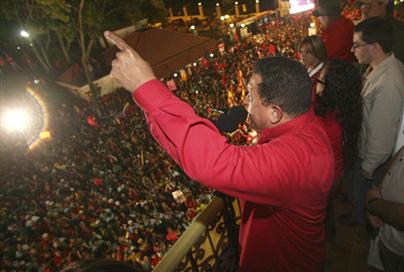Hugo Persecutes the Opposition

As I have mentioned before, Hugo Chávez is consolidating power around himself. He is now persecuting the opposition.
Manuel Rosales, mayor of Maracaibo - an elected position - is seeking political asylum in Peru. Rosales, the best-known opposition leader in the country, is a member of the 'Un Nuevo Tiempo' (A New Time) Party and was governor of the state of Zulia prior to his election as mayor of Maracaibo. He is accused of illicit enrichment. As the Washington Post reminds us, last October Chávez stated "I have decided to make Manuel Rosales a prisoner," after which the investigations against Rosales started. Chávez has sworn, "I will crush him."
Why did Rosales have to leave the country? The Washington Post, again,
Asdrúbal Quintero, a legal adviser to Rosales, said by telephone from Maracaibo that Rosales had considered showing up at a pretrial hearing Monday to argue that the money in question was earned legally through his agricultural business.Venezuelan bloggers speculate whether Rosales's exile means the end of his political career.But Quintero said the opposition leader decided to flee after Ismael García, an anti-Chávez lawmaker in the National Assembly, announced that he had obtained a draft of a sentencing document against him. The document, García said, showed that Rosales was to be sentenced to a 30-year prison term.
Rosales is not alone.
Retired General Raúl Baduel, who brought Chávez to power following the 2002 attempted coup and later was instrumental in defeating Chávez's constitutional referendum in 2007, was arrested at gunpoint on April 7, pending corruption charges. He issued from prison a plea for Venezuelans “to save democracy,” which was recorded by his son, Raúl Emilio Baduel, with his cell phone. You can watch the video (in Spanish) here.
Raúl Emilio Baduel was detained in Trinidad and later released, "because of information they had received about him" by unnamed sources. Upon returning to Venezuela, Raúl Emilio was strip-searched at Maiquetía airport. Authorities also went through his laptop.
Henrique Capriles Radonski, governor of the state of Miranda, is also prosecuted after government legislator and Chávez supporter Darío Vivas called for him to be investigated on corruption charges. Capriles has been opposed to the new Capital District Law enacted by Chávez last month.
Henrique Salas Feo, governor of the state of Carabobo, is being investigated for "promoting secession" after speaking of organizing a movement to defend regional autonomy.
César Pérez Vivas, governor of the state of Táchira, may have his victory annulled and a new election might be held.
All these governors have opposed the takeover of the transportation hubs.
Meanwhile, in Caracas, Mayor Antonio Ledezma has been ousted from his office by squatters and Chávez has created a "vice president for Caracas." Chávez created a new Capital District, effectively removing the city’s most populous borough from Ledezma’s jurisdiction. Former Minister for the Environment and staunch Chavista Jacqueline Faría, upon accepting the post, stated that Caracas is the seat of public powers and that it would be "uncomfortable" for the head of state to be surrounded by governors who oppose him. Daniel Duquenal quotes Faría describing her job as,
will have to care and supervise all services so that the capital inhabitants have a better quality of life, the new socialist life.This Washington Post editorial points out that government-controlled councils are set up to undermine trade unions, and a new law will block foreign funding of human rights groups.
Journalist and author Teodoro Petkoff, former Communist and ex-guerilla, who is the editor of newspaper Tal Cual, is also under investigation for allegedly failing to report taxes on his mother's estate in 1974.
The list keeps growing.





